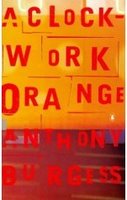
Taking my cue from my sig. o., who took his cue from a friend of his, I'm trying out this blog thing as a way to discipline myself to actually write responses to my wanderings (into both textual and actual realms). So, as a first entry,
A Clockwork Orange by Anthony Burgess.
A Clockwork Orange is NOT the sort of book I typically care to read. But it's a book about which I have heard a lot, and it's been sitting on the sig.o.'s bookshelf, lewdly winking at me, so I read it. As quickly as possible. Really, it's the first part that's the most difficult to read. It's in the first part that we are introduced to Alex's preferred way of life--violence for enjoyment. The violence that's described is horrible, but it isn't the violence that makes this part so hard to read. What makes it hard is that it's all written in the first-person. So as a reader, you don't have any distance from the character or the actions. You are there, as Alex, doing these things. And there's a part of your brain to which all of this makes sense. And
that's what makes this section so horrid. It's the realization that there's a bit of this bloodlust buried in you too.
Which gets to the philsophical theme of the book. Where does morality come from? Although we talk about cultural influences on the details of morality, we also tend to assume a kind of base level 'good' and 'bad' that transcend culture. Randomly raping or beating a complete stranger is probably universally considered 'bad'. And when someone behaves this way, we are bewildered. We want to know
why this person is so bad. And here's what Alex says,
"But, brothers, this biting of their toe-nails over what is the
cause of badness is what turns me into a fine laughing malchick. They don't go into what is the cause of
goodness, so why of the other shop? If lewdies are good that's because they like it ... "
Which leads to some interesting questions. Can we really take credit for being "good"? Might we not be good simply because we
enjoy being good? If preferring to be good rather than bad is just something wired in our brains, like preferring green to red, or liking broccoli but hating mushrooms, then can we really blame anyone for preferring to be bad? Wouldn't it be like judging someone for disliking mushrooms? This is an important question, because it's counter idea, that being good is a choice (and presumably being bad would be more fun, but we choose to be good because....empathy/religion/society/law/species survival/etc.), suggests very different things about how we respond to 'bad'.
Which leads in turn to the ethical theme of the book: what's the best social response to bad people? If being good is an active choice, then education, 'rehabilitation', the opportunity to make different choices all makes sense. But if being good isn't a choice, if it's just a broccoli-level preference, then those kinds of responses aren't going to have any effect at all. Instead, we might get something like what we see in
A Clockwork Orange: Stuffing bad people into jails turns out to be an unsatisfactory response. The jails are overflowing, and people just go on being bad inside the jails instead of outside them. But what if you could rewire bad people so that being bad felt bad? Not that being good felt particularly good (which would be an interesting, albeit much more complex, alternative), but that being bad felt really awful. Alex is conditioned so that every time he even thinks about doing something violent, he is wracked with pain and nausea. So he stops doing bad things. But everything he does do is thus insincere, merely an effort to avoid that pain. No more freewill. No more choice. Fair? Appropriate? Depends on your assumptions. If you assume someone can choose to be good, then denying them that chance is, well, bad. But if you assume they can't ever choose to be good on their own, then forcing them into that role is not so bad. And keeps the jails clear.



